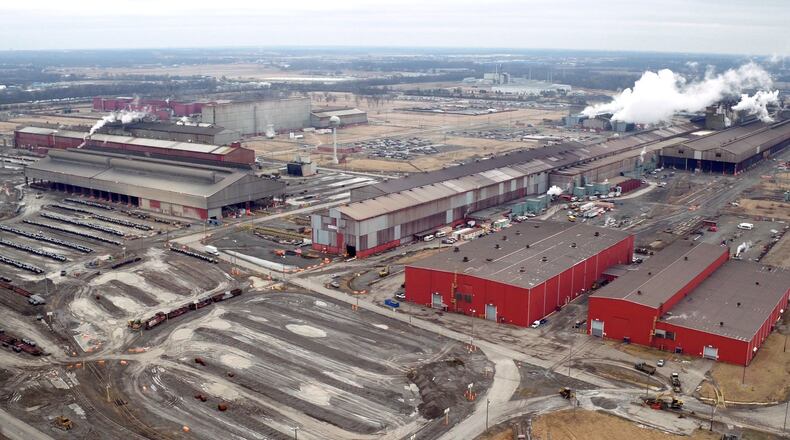While it is too early to discern how such a tariff would pan out in the long run, E.J. Ume, a Miami University assistant professor of economics with a focus on macroeconomics, said such action could be a drag on the economy.
Potential losers in such a scenarios would be corporations that depend heavily on steel and aluminum, including automakers, aviation companies, construction companies, those who serve highway infrastructure projects and beer companies, because manufacturing aluminum cans will become more expensive, Ume said.
“Their input costs will potentially go up and … that means profits go down,” he said. “That could potentially lead to layoffs, so it could actually impact the American citizens.”
In addition, consumers would likely find it costs more to purchase vehicles, canned food, beer and other items, he said.
“We don’t produce enough of that material domestically to satisfy our domestic demand, so a supply shortage would lead prices to go up,” he said.
The tariffs are viewed as a “big win” by those in the steel industry, which will be able to ramp up supply to meet demand, Ume said.
AK Steel Chief Executive Officer Roger Newport, along with leaders of other steel companies in the United States, joined Trump at the White House on Thursday to talk about Section 232 remedies.
Newport said the company, whose corporate headquarters are in West Chester Twp., supports and commends Trump for announcing the actions he plans to take to stem the tide of unfairly traded steel imports that threaten the national security of our country.
“This is a strong, important step to combat the effects of global steel overcapacity and address actions by other countries to circumvent U.S. trade laws and orders designed to ensure a level playing field,” Newport said.
AK Steel is Butler County’s third-largest employer with a total of approximately 2,400 full-time employees at its Middletown Works and corporate headquarters. It employs 9,200 people at manufacturing operations across seven states, as well as in Canada and Mexico.
But while the tariffs would likely lift the steel industry, they could also spark a trade war that hurts the broader economy, Ume said.
“It’s a big win for companies like U.S. Steel but, aside from that, I don’t know if we have any big winners,” he said. “Our trading partners are taking a hit — China, Canada, Mexico. This is not good news for them and, moreover, you have the potential for a trade war. These countries could actually retaliate. That pushes cost up even more, so the things that we import from other countries, now the price of those goods may be higher.
“Ultimately, it’s impacting the end consumer through higher prices and the potential for layoffs.”
Ohio employers that could be hurt include: GE, GE Aviation, Caterpillar, Ford, GM, Honda and many others, Ume said.
“Despite the fact that Ford buys the vast majority of its steel and aluminum for U.S. production in the U.S., this action could result in an increase in domestic commodity prices – harming the competitiveness of American manufacturers,” said Christin Baker, a Ford spokeswoman.
Matthew Shay, president and CEO of the National Retail Federation, the world’s largest retail trade association, called the tariffs “a tax on American families” and said there is nothing the United States would gain from “such a one-sided policy.”
“When costs of raw materials like steel and aluminum are artificially driven up, all Americans ultimately foot the bill in the form of higher prices for everything from canned goods to automobiles,” Shay said. “These tariffs threaten to destroy more U.S. jobs than they will create while sending an alarming signal to our trading partners and diminishing markets for American-made products overseas.”
Trade group The Beer Institute condemned Trump's announcement, saying the tariff would amount to a $347.7 million tax on beverages sold in cans and come at the further cost of tens of thousands of jobs.
MillerCoors, which employs more than 8,000 people nationwide, including 500 of them at its Butler County brewery, took to social media to say it was “disappointed” with Trump’s announcement of a 10 percent tariff on aluminum.
“Like most brewers, we are selling an increasing amount of our beers in aluminum cans, and this action will cause aluminum prices to rise,” the company tweeted. “It is likely to lead to job losses across the beer industry. We buy as much domestic can sheet aluminum as is available, however, there simply isn’t enough supply to satisfy the demands of American beverage makers like us. American workers and American consumers will suffer as a result of this misguided tariff.”
In testimony to Congress last May, AK Steel’s Newport said the company welcomes the Department of Commerce’s Section 232 investigation of the serious threat posed by imported steel to the nation’s national security.
“For decades, the steel industry has battled global overcapacity and the oversupply of U.S. imports, many of them dumped and subsidized,” Newport said. “Just since the beginning of 2015, over 14,000 steel workers have been laid off and numerous production facilities have been idled, including AK Steel’s blast furnace and steelmaking operations in Ashland, Ky. Unfortunately, unfairly traded imports remain a severe threat to the long-term viability of the domestic steel industry.”
Trump, in a series of early morning tweets Friday, insisted the tariffs would help the U.S. economy, something that has been contended by members of not only his own party, but his top advisers, as well.
“When a country (USA) is losing many billions of dollars on trade with virtually every country it does business with, trade wars are good, and easy to win,” Trump tweeted.
About the Author

